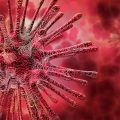DE FAAKTO OUTBREAK INTELLIGENCE
SITUATION UPDATE MERS-Cov MIDDLE EAST RESPIRATORY SYNDROME CORONAVIRUS
SAUDI ARABIA
- Middle East respiratory syndrome (MERS) is a viral respiratory disease caused by a novel coronavirus (Middle East respiratory syndrome coronavirus, or MERS‐CoV) -first identified in Saudi Arabia in 2012
- Since identified, 2,374 cases have been reported with at least 823 of them fatal (WHO)
- Coronaviruses cause diseases ranging from the common cold to Severe Acute Respiratory Syndrome (SARS)
- MERS symptoms include fever, cough and shortness of breath-Pneumonia is common, but not always present-Gastrointestinal symptoms, including diarrhoea, have also been reported
- 35% of reported patients with MERS-CoV infection have died
National International Health Regulations (IHR) Focal Point of Saudi Arabia is reporting
Key Points
- From 1 March through 8 April 2019
- 45 additional cases of Middle East respiratory syndrome coronavirus (MERS-CoV) infection
- 13 deaths
- Of the 45 cases reported, nine cases, including one death, were linked to the outbreak in Wadi Aldwasir city
The World Health Organization is Reporting
Key Points
- From 2012 through 8 April 2019
- a total of 2419 laboratory-confirmed cases of MERS-CoV
- 836 associated deaths were reported globally to WHO
- The associated deaths reported to WHO were identified through follow-up with affected member states (WHO)
De Faakto Outbreak Intelligence Risk Assessment Notes
- 9 Health Care Workers have been infected with MERS-COv
- MERS-COv infections continue to spread in health care facilities
- Infection prevention and control measures are critical to prevent spread of MERS-CoV
- Identifying MERS-COv patients is difficult because early respiratory infection symptoms are non-specific
- Health care workers must continuously apply standard precautions, and take airborne droplet precautions when performing aerosol treatments
- Health care workers require comprehensive infection control education, training and quality control to enhance infection control practices
World Health Organization Risk Assessment
Infection prevention and control measures are critical to prevent the possible spread of MERS-CoV in health care facilities.
Infection with MERS-CoV can cause severe disease resulting in high mortality. Humans are infected with MERS-CoV from direct or indirect contact with dromedary camels. MERS-CoV has demonstrated the ability to transmit between humans. So far, the observed non-sustained human-to-human transmission has occurred mainly in health care settings.
MERS-CoV appears to cause more severe disease in people with diabetes, renal failure, chronic lung disease, and immunocompromised persons. Therefore, these people should avoid close contact with animals, particularly camels, when visiting farms, markets, or barn areas where the virus is known to be potentially circulating. General hygiene measures, such as regular hand washing before and after touching animals and avoiding contact with sick animals, should be adhered to. Food hygiene practices should be observed. People should avoid drinking raw camel milk or camel urine, or eating meat that has not been properly cooked. (WHO, 2019)
Healthcare Workers Precautions
Healthcare workers should always apply standard precautions consistently with all patients, regardless of their diagnosis. Droplet precautions should be added to the standard precautions when providing care to patients with symptoms of acute respiratory infection; contact precautions and eye protection should be added when caring for probable or confirmed cases of MERS-CoV infection; airborne precautions should be applied when performing aerosol generating procedures. (WHO, 2019)
WHO https://www.who.int/csr/don/09-may-2019-mers-saudi-arabia/en/
For more information-World Health Organization-MERS-CoV Middle East respiratory syndrome coronavirus https://www.who.int/en/news-room/fact-sheets/detail/middle-east-respiratory-syndrome-coronavirus-(mers-cov)






